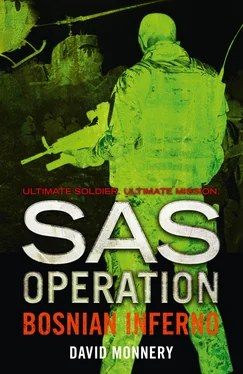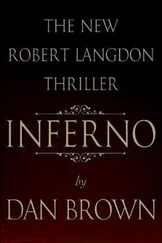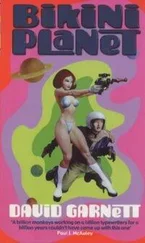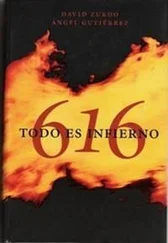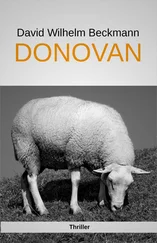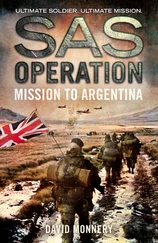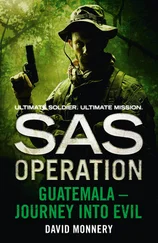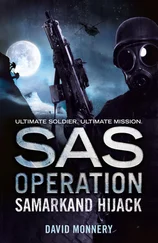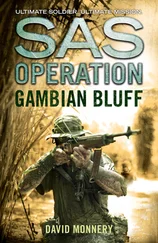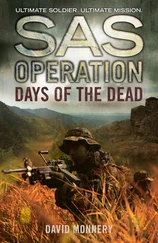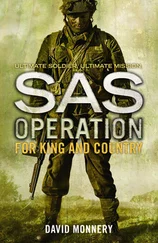Their leader had finished addressing the crowd, and was now talking to one of his cronies. Both men glanced across at the two corpses on the ground and then called over one of the men wearing a nylon mask. ‘It’s Cosic,’ Tijanic said, recognizing the local man by his walk.
The man listened to the irregulars’ leader and then pointed to one of the streets leading off the square.
‘He’s telling them where Sulejman lived,’ Reeve said. He turned to Filipovic. ‘You keep watch. One of us will be back as soon as we can.’
The other four hurried back through the house, down the steps and into the empty street. Sulejman’s house was halfway up the hill to the ruined castle, and they reached it in minutes.
The big house was deserted – either Sulejman had had the sense to move his family away, or they had witnessed his death in the square. Reeve and his men walked in through the unlocked front door and took up positions behind the colonnaded partition between hallway and living-room.
The Serbs arrived about five minutes later. There were three of them, and they sounded in a good mood, laughing and singing as they kicked their way in through the door. Several were now carrying open bottles, and not much caring how much they slopped on the floor.
‘I expect the women are hiding upstairs,’ one man said.
‘Come on down, darlings!’ another shouted out.
Reeve and the others stepped out together, firing the Kalashnikovs from the hip, and the three Serbs did a frantic dance of death as their bottles smashed on the wooden floor.
Tijanic walked forward and extracted the weapons from their grasp. ‘I’ll get these to Zukic and his boys,’ he said.
‘Three down,’ Reeve said. ‘Twenty-four to go.’
‘Daddy, help me!’ Marie insisted.
Her plea brought Jamie Docherty’s attention back to the matter in hand. His six-year-old daughter was busy trying to wrap up the present she had chosen for her younger brother, and in danger of completely immobilizing herself in holly-patterned sticky tape.
‘OK,’ he said, smiling at her and beginning the task of disentanglement. His mind had been on his wife, who at that moment was upstairs going through the same process with four-year-old Ricardo. Christmas was never a good time for Isabel, or at least not for the past eighteen years. She had spent the 1975 festive season incarcerated in the cells and torture chambers of the Naval Mechanical School outside Buenos Aires, and though the physical scars had almost faded, the mental ones still came back to haunt her.
His mind went back to their first meeting, in the hotel lobby in Rio Gallegos. It had been at the height of the Falklands War, on the evening of the day the troops went ashore at San Carlos. He had been leading an SAS intelligence-gathering patrol on Argentinian soil, and she had been a British agent, drawn to betray her country by hatred of the junta which had killed and tortured her friends, and driven her into exile. Together they had fought and driven and walked their way across the mountains to Chile.
More than ten years had passed since that day, and they had been married for almost as long. At first Docherty had thought that their mutual love had exorcized her memories, as it had exorcized his pain at the sudden loss of his first wife, but gradually it had become clear to him that, much as she loved him and the children, something inside her had been damaged beyond repair. Most of the time she could turn it off, but she would never be free of the memories, or of what she had learned of what human beings could do to one another.
Docherty had talked to his old friend Liam McCall about it; he had even, unknown to Isabel, had several conversations with the SAS’s resident counsellor. Both the retired priest and his secular colleague had told him that talking about it might help, but that he had to accept that some wounds never healed.
He had tried talking to her. After all, he had told himself, he had seen enough of death and cruelty in his army career: from Oman to Guatemala to the Falls Road. That wasn’t the same, she’d said. Nature was full of death and what looked like cruelty. What she had seen was something altogether more human – the face of evil. And he had not, and she hoped he never would.
Somehow this had created a distance between them. Not a rift – there was no conflict involved – but a distance. He felt that he had failed her in some way. That was ridiculous, and he knew it. But still he felt it.
‘Daddy!’ Marie cried out in exasperation. ‘Pay attention!’
Docherty grinned at her. ‘Sorry,’ he said. ‘I was thinking about Mummy,’ he explained.
His daughter considered this, her blue eyes looking as extraordinary as ever against the rich skin tone she’d inherited from her mother. ‘You can think about her when I’ve gone to bed,’ Marie decided.
‘Right,’ Docherty agreed, and for the next ten minutes he gave her his full attention, completing the wrapping of Ricardo’s present and conferring parental approval on Marie’s suggested alterations to his positioning of the silver balls and tinsel on the tree. And then it was bedtime, and his turn to read to Ricardo. When he had finished he stood for a moment in the doorway to Marie’s room, listening to Isabel reading, the bedside lamp making a corona around his wife’s dark head as she bent over the book.
He walked downstairs, blessing his luck for finding her. Few men, he reckoned, found one such woman in their lives, and he had found two. True, with both there had been a price. Chrissie had been killed in a road accident only months after their marriage, sending him into a downward spiral of drunkenness and self-pity which had almost cost him his career and self-respect. Like Margaret Thatcher, he had been saved by the Falklands War, and in the middle of that conflict fate had led him to Isabel, who came complete with a hurt he longed in vain to heal. But he wasn’t complaining – now, at the grand old age of forty-two, Jamie Docherty would not have swapped places with any man.
He went through to the kitchen, opened a can of beer and poured it into the half-pint mug he had liberated from an officers’ mess in Dhofar nearly twenty years before.
‘How about one for me?’ Isabel asked him from the doorway, a smile on her face.
He smiled back and reached for another can.
She sat down on the other side of the kitchen table, and they shared the silence for a few moments. Her smile had gone, he noticed.
‘What is worrying you?’ she asked suddenly.
You, he thought. ‘Nothing really,’ he said, ‘maybe the future. I’ve never been retired before. It’s a strange feeling.’ He grinned suddenly. ‘Let’s face it, we haven’t even decided which continent we’re going to live in.’
‘There’s no hurry,’ she said. ‘Let’s get Christmas out of the way first.’ She put down her half-empty glass. ‘You still want fish and chips?’ she asked.
‘Yeah, I’ll go and get them.’
‘You stay with the children. I feel like some fresh air.’
And some time on your own, Docherty thought. ‘You sure?’ he asked.
‘ Sí, noes problema .’
Docherty continued sipping his beer, wondering how many other households there were in Glasgow where all four occupants often moved back and forth between English and Spanish without even noticing they had done so. He had become fluent in the latter during the half year’s compassionate leave he had spent travelling in Mexico after Chrissie’s death. Isabel had acquired her bilingual skills before meeting him, during the seven years of her enforced exile in England.
Still, their linguistic habits were hardly the strangest thing about their relationship. When they had met he had been a ten-year veteran of the SAS and she one of the few surviving members of an Argentinian urban guerrilla group. If the Sun had got hold of the story their marriage would have made the front page – something along the lines of ‘SAS Hero Weds Argie Red’.
Читать дальше
